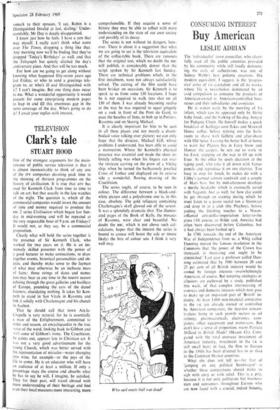Clark's tale
TELEVISION STUART HOOD
One of the strongest arguments for the main- tenance of public service television is that it is almost inconceivable to think of any one of the ITV companies devoting peak time to the showing of thirteen programmes on the history of civilisation. It is true that ATV has used Sir Kenneth Clark from time to time to talk on art; but that usually in the late watches of the night. The question is, which of the commercial companies would invest the amount of time and money required to produce the BBC 2 series Civilisation which began last Sun- day in mid-evening and will be repeated at the very respectable hour of 9 p.m. on Fridays? It would not, as they say, be a commercial proposition.
Clearly what will hold the series together is the presence of Sir Kenneth Clark, who worked for two years on it. He is an im- mensely skilled presenter with the power of a good lecturer to make connections, to draw together events, historical personalities and ob- jects, and thereby make sense to the layman of what may otherwise be an inchoate mass of facts: those strings of dates and names you may hear at any time in the tourist season echoing through the great galleries and basilicas of Europe, pounding the ears of the dazed listeners, elucidating nothing. It takes Sir Ken- neth to stand in San Vitale in Ravenna and link it solidly with Charlemagne and his church in Aachen.
That he should call that town Aix-la- Chapelle is very natural, for he is essentially a man of the Enlightenment, committed to order and reason, an encyclopaedist in the true sense of the word, looking back to Gibbon and with some of Gibbon's irony. The Crucifixion, he points out, appears late in Christian art. It was not a very good advertisement for the young Church, which was better served with the representation of miracles—water changing Into wine, for example—or the joys of the life to come. He is an educator who will have an audience of at least a million. If only a percentage stays the course and absorbs what he has to say he will, I imagine, be satisfied. They for their part, will travel abroad with more understanding of their heritage and find even their local museums more interesting, more.
comprehensible. If they acquire a sense of history they may be able to reflect with more understanding on the state of our own society and possibly of its decay.
The series is not without its dangers. how- ever. There is about it a suggestion that what we are going to see is the television equivalent of the coffee-table book. There are rumours that the original text, which no doubt the BBC will publish, is considerably denser than the script spoken by Sir Kenneth last Sunday. There are technical problems which, in the first instalment, were not always satisfactorily solved. The cutting of the film could have been brisker on occasions. Sir Kenneth is to speak to us from some 130 locations. I hope he is not required to walk into shot on all 130 of them. I was already becoming restive at the way he was required to squat gingerly on a rock in front of the Pont du Gard, to pace the beaches of Iona, to bob up in Poitiers, Ravenna and on Skerrig Michael.
It is clearly important for him to be seen in all these places and not merely a disem- bodied voice talking over picture; we can only hope that the director, Michael Gill, whose problems I understand, has been able to avoid a mannerism. Where Sir Kenneth's physical presence was essential and made the shots in- finitely telling was when his fingers ran over the intricate carving on the prow of a Viking ship, when he turned the barbarously jewelled Cross of Lothar and displayed on its reverse side a wonderful, flowing drawing of the Crucifixion.
The series ought, of course, to be seen in colour. The difference between a black-and- white picture and a polychrome one is, in this case, absolute. The gold reliquary containing Charlemagne's skull glowed out of the screen. It was a splendidly dramatic shot. The illumin- ated pages of the Book of Kells, the mosaics of Ravenna, were clear and beautiful. No doubt the BBC, which is not above such cal- culations, hopes that the interest the series is bound to arouse will boost the sale or (more likely) the hire of colour sets. I think it very well may.
Who said music-hall was dead?


































 Previous page
Previous page